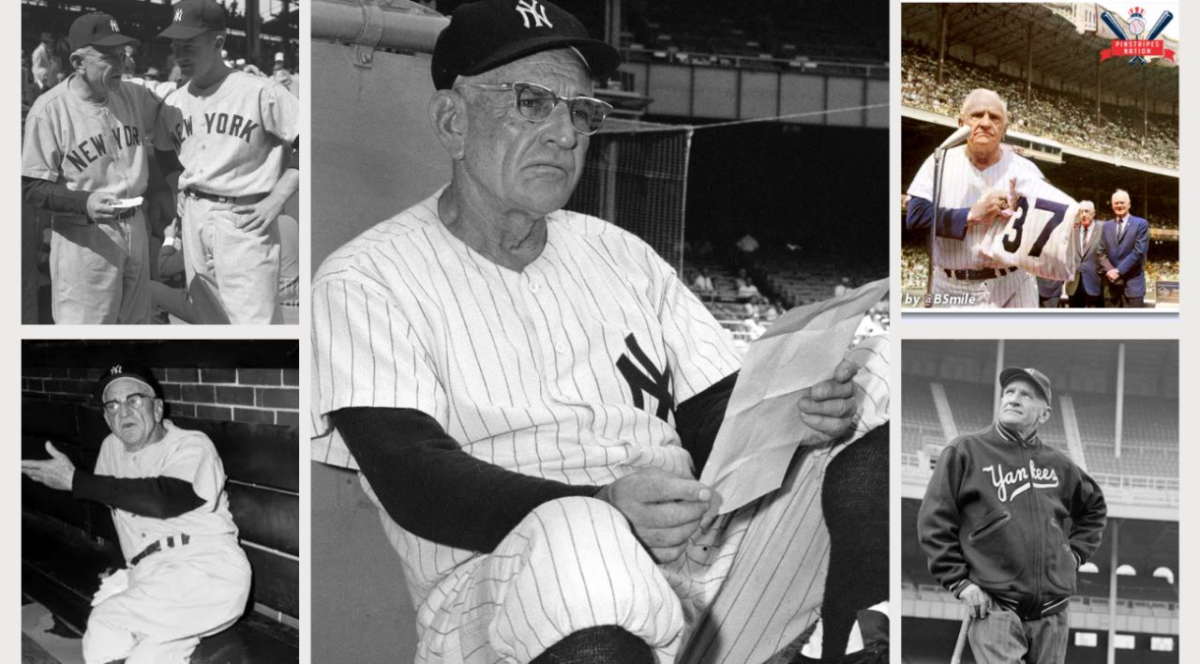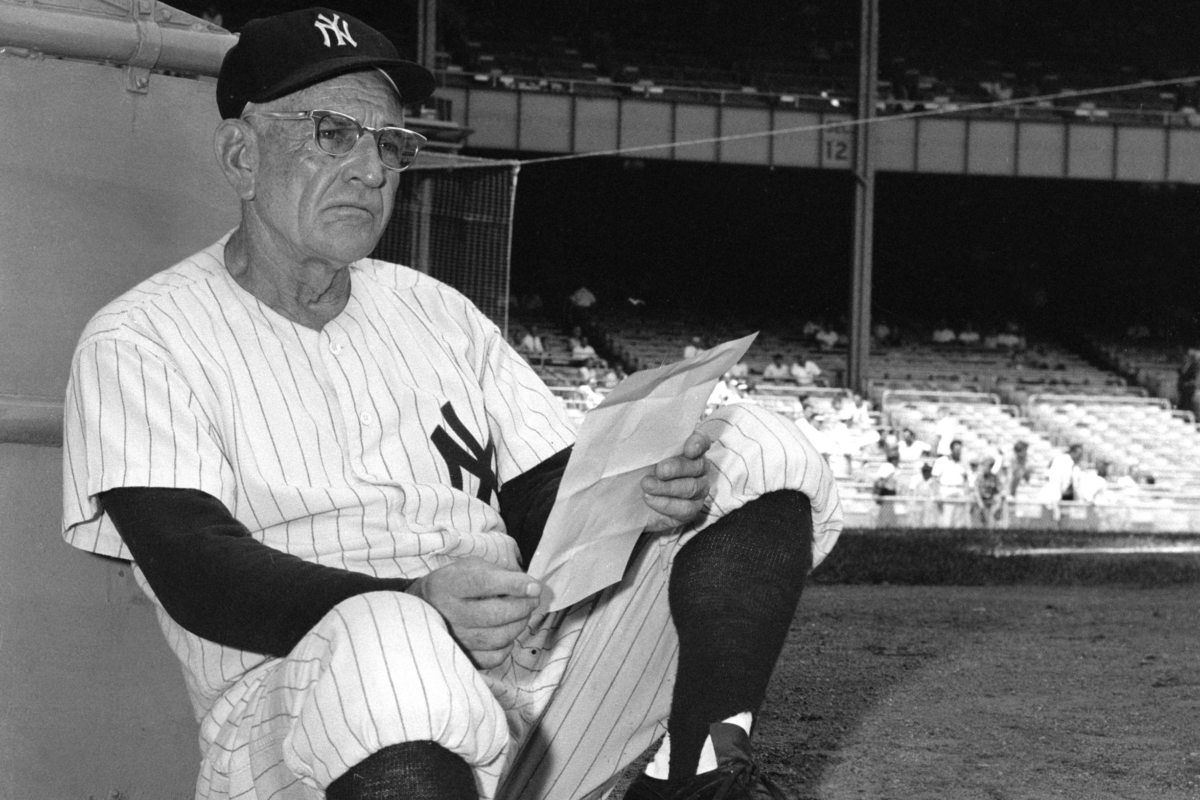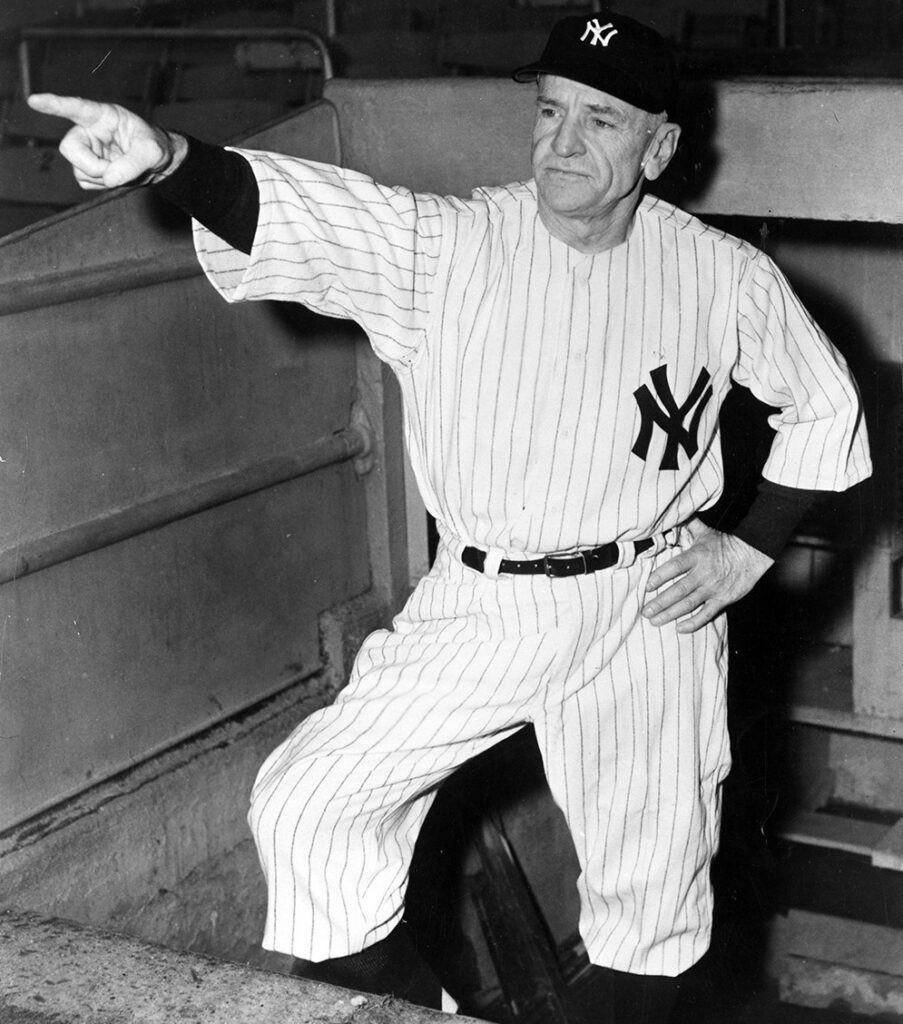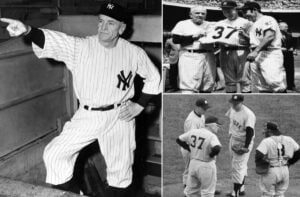Remembering Casey Stengel on the day Yankees retired his No. 37

John Allen
More Stories By John Allen
- Mother’s Day: How Anthony Volpe’s mom molded him into a Yankee phenom
- Juan Soto meets with Yankees leadership as Dodgers join star-studded free agent chase
- Yankees’ Luis Gil joins elite company with AL Rookie of the Year win
- Yankees prep for Rule 5 draft by adding two players to MiLB roster
- CC Sabathia makes Hall of Fame ballot debut, headlining Yankees-heavy 2025 class
Table of Contents
On August 8, 1970, 53 years to date, the Yankees retired Casey Stengel‘s Number 37. He is best known as the manager of the New York Yankees team that dominated the MLB from 1949 to 1958 with seven World Series wins. The manager entered the Cooperstown Hall of Fame in 1966.
Marty Appel, a baseball author, and historian, famously dubbed Casey Stengel “Baseball’s Greatest Character” because he was the only manager to ever win five consecutive World Series titles from 1949 to 1953. He even appeared on the cover of Time Magazine twice.
During the twelve years Casey Stengel led the Yankees, they won 10 pennants and seven World Series championships. This was the most successful period for any manager in the history of baseball. In only one of those twelve seasons did his teams win less than 90 games. Casey Stengel’s record as a Yankees manager was 1,149 wins to 696 losses, giving him a winning percentage of .623.
Casey Stengel’s playing career
During his playing days, Casey Stengel was in the same era as Babe Ruth. He also played for the New York Giants under manager John McGraw, and that experience taught him a great deal about baseball. He had a respectable lifetime batting average of .284, and in the World Series, he performed even better with a.393 batting average. However, Casey Stengel is more famous for his entertaining behavior and lively personality.
After moving from the Brooklyn Dodgers to the Pittsburgh Pirates, Casey Stengel faced his old team at Ebbets Field. When he came up to bat for the first time, he teased the unfriendly crowd. In response to the loud booing, Casey Stengel took a bow, and as he removed his cap, he revealed a hidden sparrow. The bird flew around the stadium, which changed the mood from hostility to amusement. The crowd burst into laughter and eventually applauded the unexpected and entertaining moment.
During the 1921 World Series, he wasn’t in the game, but Casey Stengel managed to get his name on the official record by getting thrown out of the game for arguing with the umpire.
Casey Stengel, not Babe Ruth, was the one who hit the first home run at Yankees Stadium during Game 1 of the 1923 World Series, and it helped his team the New York Giants win that game. He also hit another winning home run in Game 3. As he ran around the bases, he blew kisses to the audience and playfully teased Babe Ruth and the Yankees dugout.

In 1946, Casey Stengel guided the Oakland Oaks to a second-place spot in the Pacific Coast League. Then, in 1948, as the manager of the Oakland Oaks once again, he led the team to victory and won the minor league championship, with young Billy Martin on the team. This success prepared him for what would become the most significant accomplishment of his life. Del Webb, one of the New York Yankee owners, asked him to manage the Yankees at the suggestion of the serious and business-focused General Manager George Weiss. Casey Stengel and Weiss had been friends for many years.
On October 12, 1948, just six days after the Yankees’ previous manager, Bucky Harris, was let go, Casey Stengel became the new manager of the team. This man, who had once dreamed of becoming a left-handed dentist, was now leading the Yankees. He was introduced as the skipper in a big press conference and fancy luncheon held at the upscale 21 Club in Manhattan.
Casey informed the gathered audience that some might consider him a fool due to his ability to make people laugh. He further mentioned that his appointment wasn’t solely due to friendship. He emphasized that the Yankees were a substantial financial investment, and such positions weren’t granted simply for personal likability. Casey stated that he was chosen for the role because those involved believed he could deliver results.
Casey Stengel as Yankees manager

During Casey Stengel’s first year as a rookie manager, the Yankees faced significant challenges due to injuries. The well-known outfield trio of Charlie Keller, Joe DiMaggio, and Tommy Henrich couldn’t play together. Keller was absent for the entire season, DiMaggio’s heel was injured, and he didn’t play until June 28. The team’s standout shortstop, Phil Rizzuto, also missed a considerable amount of playing time.
Casey Stengel dealt with the challenges and devised strategies. He depended on players such as Cliff Mapes, Dick Kryhoski, and Fenton Mole, who weren’t the main stars of the team. He skillfully juggled and combined different players, adjusting from one game to the next, and effectively managed the team despite the difficulties.
Under Casey Stengel’s leadership, the Yankees started their journey to win five consecutive world championships in 1949. In that initial year, the manager made his mark on every aspect of the Yankees’ operations. While there was a Yankee culture already in place, his influence transformed it into a distinctive Casey Stengel Yankee culture. This culture would define the team during 1949 and throughout Stengel’s time as manager. It also became an integral part of the Yankees’ tradition for many years to follow.
The “Ol’ Professor,” known for his rough voice, became a well-established figure within the Yankees. Casey Stengel achieved a level of fame that rivaled, or even exceeded, that of his star players. His popularity extended beyond the baseball world, and he became widely recognized on a national level.
When Casey Stengel took over the Yankees, many saw them as a strong team. But in just three years, he transformed the team into something entirely new. Instead of relying heavily on big-name stars, Casey Stengel focused on developing a core trio of players: Mickey Mantle, Yogi Berra, and Whitey Ford. The rest of the team mainly consisted of role players. Casey Stengel encouraged competition among them for playing time, pushing them to perform their best. He emphasized loyalty to the team and took pride in being part of the Yankees. Players knew they had a good chance at making it to the postseason under his guidance, which felt like a special bonus for being part of his team.
In 1958, the Yankees won the pennant by a comfortable 10-game margin. However, in 1959, they ended up in third place, which was their worst performance during Casey Stengel’s tenure. This made some people think that the team’s success might be coming to an end. At almost 70 years old, Casey Stengel became more impatient and started making unconventional moves during games, even for himself.
However, in 1960, during a challenging pennant race, Casey Stengel motivated the Yankees to win another pennant. Unfortunately, Bill Mazeroski’s walk-off home run in the World Series gave the championship title to Pittsburgh.
Yankee owners Dan Topping and Del Webb, who had been considering letting go of Stengel for a while, used the World Series loss to the Pirates as a reason to do so. Casey Stengel was fired. In reality, he was pushed out of the managerial position due to a rule that required retirement at the age of 65—specifically for him.

Casey Stengel’s life after Yankees’ manager
After achieving seven World Series Championships with the New York Yankees, Casey was asked to manage the struggling expansion team, the 1962 New York Mets. He had a way of speaking, often called Stengelese, that amused the press and diverted attention from the team’s lackluster performance on the field. He used this kind of talk to avoid answering questions directly. For instance, when asked about the new Shea Stadium being built for the Mets, he humorously said, “The park is lovelier than my team.” Surprisingly, the Mets won the 1969 World Series after Casey Stengel had retired. Although he wasn’t actively managing, he was still credited with creating a diversion that helped the team succeed, and he received another championship ring.
Casey Stengel is positioned at the 13th spot on the MLB’s all-time wins list with a total of 1,905 wins, and his career winning percentage is .508%. These stats, along with his seven World Series championships, definitely make him deserving of acknowledgment as one of the finest managers in the game’s history. Yet, there are critics who point out that he led one of the most skilled lineups in the history of MLB.
Due to his age, Major League Baseball created a special exception to the 5-year waiting rule. As a result, Casey Stengel, along with Ted Williams, was inducted into the Baseball Hall of Fame in 1966. His speech at the induction ceremony in Cooperstown was quite memorable, and he has left behind many memorable quotes throughout his years in the game.
Casey Stengel eventually lost his battle with cancer in 1975 and was laid to rest at Forest Lawn. Rod Dedeaux, a baseball coach at the University of Southern California and a long-time friend of the Stengels, delivered a eulogy and cited Jim Murray’s column, which remarked upon Stengel’s passing by saying, “Well, God is certainly getting an earful tonight.”
What do you think? Leave your comment below.

 Follow Us
Follow Us










God Rest your soul ..Casey Stengel !!!. One of the Yankee GREATS !!!. Enough Said !!!.
Casey Stengel was definitely one of a kind. Part of Yankees lore and a credit to the game he lived so much and literally gave his life to and for. Rest In Peace Casey.